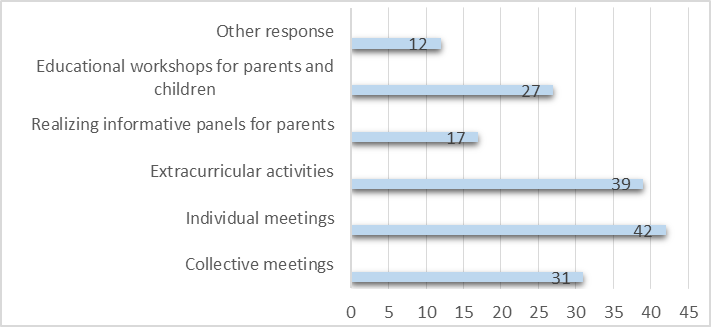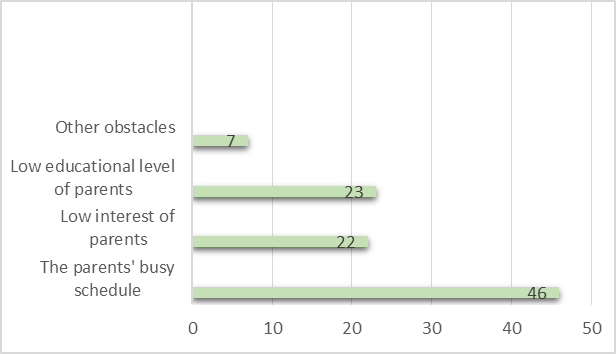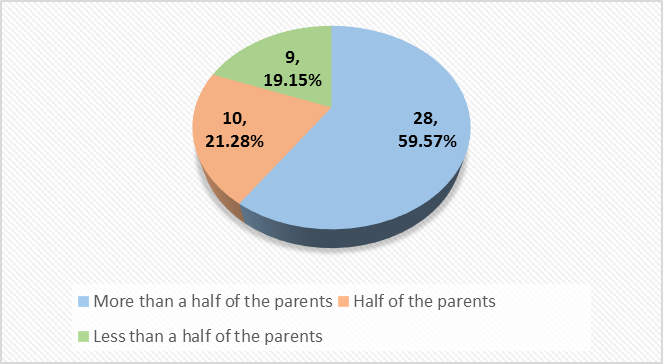Abstract
This paper includes a study of primary school teachers’ vision about the most effective methods of strengthening the school-family partnership during the preparatory grade, the first year of study of the Romanian primary educational system. We aim at identifying optimum solutions for practitioners based on teachers’ vision about the best practices regarding the matter of school partnerships. Students’ families are the most important partners of the school representatives and significantly influence children’s development and education. This study offers a large number of effective methods of enhancing school-family cooperation during the preparatory grade, relying on the present educational realities of Romania. We have discovered that the most effective and frequently used strategies of consolidating the school-family partnership are individual meetings, extracurricular activities, and collective meetings. Teachers’ opinion regarding the frequency, duration, and contents of common activities of parents and children are: activities should be realized at least once a month or semester, they should be accessible and interesting for the children and they should be designed in accordance with the curriculum.
Keywords: School-family partnershippreparatory gradeRomanian primary educational systemfamily involvement
Introduction
The process of cooperation between school and family continues to be a current topic of reflection for theoreticians and teachers. The effects of an effective partnership could be observed in children’s school evolution. (Epstein et al., 2002; Agabrian & Millea, 2006; Băran-Pescaru, 2004; Taciu-Răduț, Bocoș & Chiș, 2015). We consider that the school-family partnership could be defined as a strong cooperation between school and family, which supports the process of development and education of children, according to society’s demands. In order to maintain a good relationship with the teachers, the family should: be actively involved in school life, participate in school activities, communicate and cooperate effectively with the school representatives, constantly adapt to the school demands and offer their help unconditionally, when it is necessary (Marin & Bocoș, 2016). At the same time, the school should encourage parents’ initiative, offer support and create a favourable environment. Positive attitudes of both teachers and parents can facilitate children’s development and education (Pancu & Bocoș, 2016).
Strategies for strengthening school-family cooperation in the Romanian primary educational system
The literature on school-family partnership contains general recommendations for teachers interested in stimulating parents’ involvement in school life. According to Taciu-Răduț, Bocoș & Chiș (2015), some of the most frequently used methods of consolidating the school-family partnership are collective meetings, individual meetings and consultations, writing weekly or monthly reports, use of correspondence notebooks, home visits, volunteering, participation in school activities and in extracurricular activities.
Problem Statement
We consider that the beginning of the primary school level is a critical moment for parents, children, and teachers, when the school-family partnership should be built with care. This paper addresses the problem of establishing effective strategies for consolidating the school-family partnership. These strategies should be easy to apply by the primary school teachers during the preparatory grade. In the Romanian Education System, preparatory graders are children usually aged 6 or 7. The beginning of the primary education level and the process of accommodation to the school demands is a critical moment that significantly influences their school evolution. Taking into account all these aspects, we are interested in discovering teachers’ opinion about the most effective methods of consolidating the school-family partnership during the preparatory grade. The solutions proposed by the teachers and the results of this investigation are useful for primary school teachers and school counsellors interested in finding effective strategies to consolidate the school family-partnership.
Research Questions
The main research question was: What are, from teachers’ perspective, the most effective methods of consolidating the school-family partnership during preparatory grade? Teachers’ opinions, based on educational realities and current practices, are very valuable and worth of being taken into consideration. In addition, the answers to the following questions were deemed important for our investigation process:
What is, from the teachers' perspective, the optimum content of the parents-children collaborative activities?
How many of the parents are actively involved in children’s education and could be considered real partners of teachers?
Which are the main obstacles that could intervene in establishing good relationships between school and families?
Purpose of the Study
We have conducted this study with the purpose of analysing teachers’ opinions in regard to the most appreciated and frequently used strategies in building functional and effective school-family partnerships during the preparatory grade. None of the studies published after the implementation of the preparatory grade at the primary school level, in 2012, was concerned with establishing effective methods of consolidating school-family partnership during the preparatory grade. We consider that during this year, teachers and parents should know each other better, should interact very frequently and always act for the benefit of the children.
Research Methods
The methods used in the research are the questionnaire survey and the case study. 60 teachers from different counties from Romania, such as Bacău, Prahova, Constanța, Galați, Sălaj, Botoșani, Suceava, Buzău, Timiș, Alba, Brașov, Satu Mare, Ialomița, Vrancea, Dâmbovița and Cluj County participated in this study. The survey conducted was realized in the online environment. This quantitative research used as the main data collection instrument a questionnaire prepared by D.-C. Marin and applied during the 2016-2017 school year. This questionnaire was composed of 4 opened or semi-opened questions. All the respondents are aged 19 to 63 years old, and their mean age is of 40.7 years. The results are presented below.
The answers to question 1, “What are the most effective methods of building the school-family partnership that you have used during the preparatory grade?”, showed that most teachers considered that individual meetings, collective meetings, and extracurricular activities are strategies useful to be applied at the beginning of the primary educational level. (see Figure

The answers to question 2, “Which are the obstacles that you have identified in building the partnership between school and families of the preparatory graders?”, showed that one of the most frequent factors that influenced the school-family partnership in a negative way is the parents’ busy schedule (see Figure

The answers selected for question number 3, “How many parents of the students of the preparatory grade were interested in cooperating continuously and effectively with you?” indicate that the majority of the respondents (59.57%) cooperated well with more than half of the parents. Other respondents indicated that they cooperated well with a half of the parents or with less than a half of the parents. (see Figure

Question number 4 is “What is your opinion in relation to the frequency, duration and the content of common activities of parents and children who are enrolled in the preparatory grade, so as to prove their effectiveness regarding building an authentic partnership between school and family?” The answers of the participants in regard to the contents of the activities were included in Table
Activities could be organized annually, biannually, monthly or weekly, in the afternoon, and should have a duration of between one and two hours. Other respondents considered that parents and students should be consulted in regard to the contents, frequency, and duration of the activities during the parents' collective meetings. The main characteristics of this type of activities are: interesting for children, compatible with students’ age, and being in accordance with the primary school curriculum. Other recommended types of activities are trips and various types of games. Some of the participants of the study outlined that at this age, students have very close affective relationships and the presence of parents is beneficial for students and teachers. At the same time, in the teachers' opinion, some of the parents really want to participate in the activities. These activities could be realized to mark special events like Mother’s Day, Christmas etc. Each activity could involve all parents or could be realized with only a part of them (4-5 parents is considered sufficient). Some of the factors that ensure the success of the activities are understanding the rules, trust, positive attitudes towards everyone and offering to help when it is necessary. During the activities, parents may act as resources providers and should be actively involved. Activities should have diverse contents, should be based on games and attractive common learning tasks, should take place in a relaxing atmosphere, should be interesting, desirable and constructive for children.
We believe that a high level of parental involvement in school life is influenced significantly by the teachers’ efforts to consolidate school-family partnerships. For example, the checklist included below presents all the strategies used in the 2016-2017 school year by one of the teachers involved in this study, who cooperated well with more than a half of the parents. We have compared the teacher’ opinion with the recommendations from the specialty literature. The results were included in Table
Findings
According to the teachers’ opinion, the most effective and frequently used strategies of consolidating the school-family partnership are individual meetings, extracurricular activities, and collective meetings. We consider that a high level of parental involvement could be influenced by teachers’ attitudes and strategies used for building partnerships. The main obstacles that influence the quality of cooperation between teachers and parents in a negative way are: the busy schedule of parents, parents’ low interest, and the low educational level of the parents. The majority of the teachers considered that more than a half of the parents were interested in cooperating continuously and effectively with them. Teachers’ opinion regarding the frequency, duration, and contents of common activities of parents and children are: activities should be realized at least once a month or semester, they should be accessible and interesting for the children and they should be designed in accordance with the curriculum. At the same time, teachers considered that parents could be consulted for establishing the frequency, duration, and contents of the activities.
Conclusion
Teachers agree that on the beginning of the primary educational level, frequent meetings between teachers and parents should be organized and a high level of interest from parents should exist in regard being actively involved in children’s education. We consider that research on the effective methods of strengthening the school-family partnership should be continued with the purpose of facilitating the teacher’s job in relation to finding effective ways of cooperating with the families in favour of children and to support parents’ efforts in helping children in succeeding at school. We can conclude that school should be an open environment for parents and children, which would help them achieve their educational goals.
Acknowledgments
We would like to thank all the participants for their support in conducting this study.
References
- Agabrian, M., & Millea, V. (2006). Școala, familia, comunitatea. Iași: Editura Institutul European.
- Băran-Pescaru, A. (2004). Parteneriat în educație: școală-familie-comunitate. București: Editura Aramis Print.
- Epstein, J. L., Sanders, M. G., Simon, B. S., Salinas, K. C., Jansorn, N. R., & Van Voorhis, F. L. (2002). School, Family and Community Partnerships, Your Handbook for Action, 2nd edition, Thousand Oaks, CA:Corwin Press.
- Marin, D.-C., & Bocoș, M. (2016). Characteristics of the Communication between Parents and Students of the Preparatory Class. Barriers, Positive Factors, and Responsibilities of Teachers, Educatia 21 Journal, 1, 1-4.
- Pancu, D.-C, & Bocoș, M. (2016). Strategies for Improving School – Family Cooperation in the Romanian Primary Educational System, The European Proceedings of Social & Behavioural Sciences EpSBS, XVIII, 481–486.
- Răduț-Taciu, R., Bocoș, M.-D., Chiș, O. (coord.). (2015). Tratat de management educațional pentru învățământul primar și preșcolar. Piteşti: Editura Paralela 45.
Copyright information

This work is licensed under a Creative Commons Attribution-NonCommercial-NoDerivatives 4.0 International License.
About this article
Publication Date
28 June 2018
Article Doi
eBook ISBN
978-1-80296-040-2
Publisher
Future Academy
Volume
41
Print ISBN (optional)
-
Edition Number
1st Edition
Pages
1-889
Subjects
Teacher, teacher training, teaching skills, teaching techniques, special education, children with special needs
Cite this article as:
Marin, D., Bocoș, M., & Călin, C. (2018). Effective Methods Of Strengthening The School-Family Partnership During The Preparatory Grade. In V. Chis, & I. Albulescu (Eds.), Education, Reflection, Development – ERD 2017, vol 41. European Proceedings of Social and Behavioural Sciences (pp. 1011-107). Future Academy. https://doi.org/10.15405/epsbs.2018.06.12

